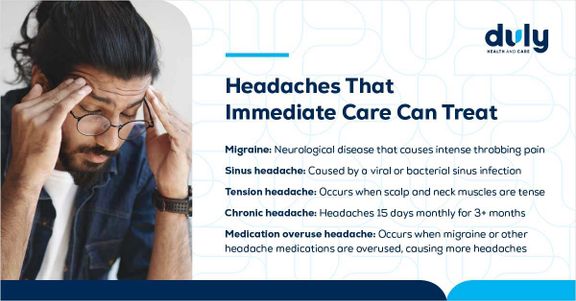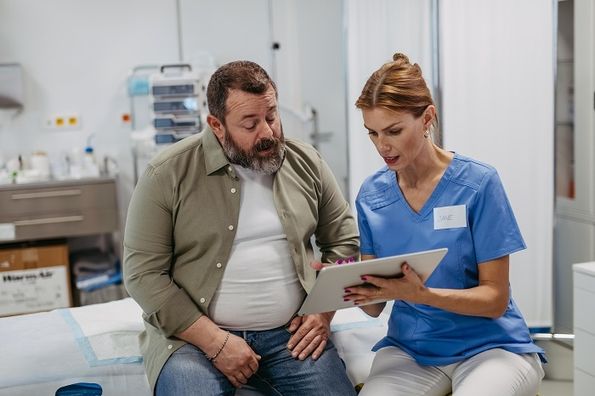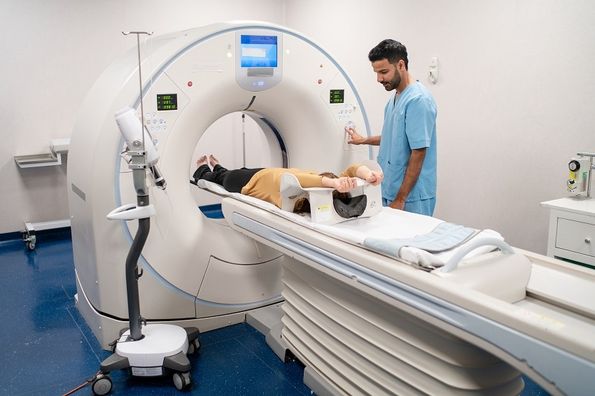You turn off the light. Close the blinds. Drink water. Lay down as soon as you can. It’s another headache or migraine. This is the routine now. Maybe you’re finding yourself shutting out the world more and more because of the pain.
Most everyone gets a headache every now and then. But migraines are another thing. Pain from migraines might slow you down or completely stop you from going to work, school or attending important life events.
If you have either a headache or migraine, you might try to treat it at home, but sometimes you may need to go to one of our nearby Immediate Care Centers.
What Kind of Headaches Can Immediate Care Treat?
There are different types of headaches. Sometimes you might try to get rid of it or wait it out, but if it’s getting worse or just not going away, it might be time to visit one of Duly’s Immediate Care locations.

When you’re in pain, and home remedies are not giving you any relief, you might want to set up an appointment with your provider. If it’s not life-threatening, but the headache is impacting your quality of life, Immediate Care is the best option.
Can You Have Headaches From a Concussion?
If you’ve had a concussion recently, a headache is a common symptom. The good news is that the headaches usually stop for most people after a month. Plenty of rest is recommended. If you’re still noticing headaches after that or they’re becoming too frequent, our Immediate Care team can evaluate you and determine if you need a new treatment plan.
Are your headaches severe and not responding to home treatment? You’ll want to visit Duly Health and Care’s Immediate Care right away. We accept walk-ins and appointments. Find a location near you.
Headaches that Shouldn’t be Treated at an Immediate Care
Sometimes your headache pain can be a symptom of a health problem. If it’s paired with an uncommon symptom you’re experiencing for the first time, you need to call 911 or go to the emergency room.
Here are 6 reasons you should immediately seek emergency assistance.
1. Your Headache or Migraine Is Paired with New Symptoms
If you’re suffering from a headache or migraine, and are experiencing new symptoms like trouble seeing, a fever, or confusion, call 911. Any of these symptoms combined could possibly be a sign of a serious health condition like meningitis, stroke or an aneurysm, which needs to be treated by an emergency care team.
2. You Suddenly Experience Problems Seeing
If you experience a sudden intense headache with blurred vision and eye pain, you should seek care right away. You might have acute angle-closure glaucoma — an eye condition that damages your optic nerve, which helps you to see.
This is considered an emergency because if it’s not treated it can cause you to go blind. The emergency team will relieve the fluid pressure (intraocular pressure, or IOP) in your eyes with medicine and eye drops when caught right away.
3. You Have a Fever and a Headache or Migraine
Sometimes a headache with a fever can be the cold or flu, but then there are times where it can be much more serious. If your symptoms include a headache, fever and stiff neck, it could possibly be bacterial meningitis. Your protective membrane — the layer of tissue that covers your spinal cord and brain — begins to swell when there’s an infection because bacteria has entered your body.
This is a serious health condition that requires immediate attention because if left untreated, it might cause your brain to swell, or worse, death. The good news is that when treated with antibiotics early, most people recover.
4. You Experience Confusion with a Headache or Migraine
If you, or someone you know, suddenly has a severe headache and becomes confused, these could possibly be early warning signs of a stroke. This is an emergency and you should call 911. Every second counts, so if you’re in an ambulance your life-saving treatment begins immediately.
5. You have Nausea and a Headache or Migraine
Feeling nauseous with a severe headache — the most intense headache you can experience — can be a sign of an aortic aneurysm. This happens when your large artery — the one that takes blood from your heart and moves it along your chest and torso — breaks or tears.
This news might be overwhelming to hear, but our providers are fully trained and experienced in dealing with this health issue. They’ll immediately evaluate the situation and determine if you need medicine to bring down your blood pressure, or if surgery is the necessary next step to fix the aorta.
6. You’re Pregnant with High Blood Pressure — And a Headache
Every pregnancy journey is different. Some women have symptoms, or none at all. It might be confusing at times to know when something is normal or not, but if you’re experiencing a headache, trouble seeing, and have high blood pressure, you might have preeclampsia.
If you’re pregnant with high blood pressure (a sign of preeclampsia), this is a health condition that’s often referred to as a “silent killer” because it usually has no symptoms. High blood pressure is the cause for 7.4% of deaths in US pregnant women.
If you’ve had a history of high blood pressure during your pregnancy, and now you’re experiencing a headache or migraine, this might be urgent enough to seek immediate medical attention if you’re pregnant.
This might sound scary, and we know you want your baby to be healthy, but you’re in great hands. Our maternal fetal medicine physicians have the expertise to give you and your baby the additional medical care you might need. Also, preeclampsia symptoms typically don’t last more than 6 weeks after you’ve had your baby. For most women, the symptoms go away within that time frame, and they have healthy babies.
What to Expect When You Go to Immediate Care
When you arrive at Duly’s Immediate Care, which is staffed by board-certified emergency and family medicine physicians, you’ll tell them your symptoms and they might need to run some tests to find the underlying cause of your headache or migraine. You know your body so if you don’t feel right, you should always seek immediate care. They’ll find a treatment that is right for you.
Health Topics:








